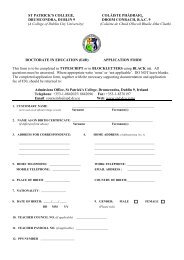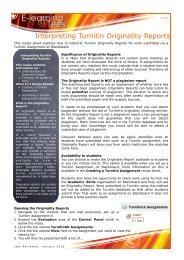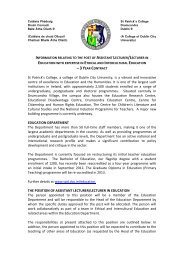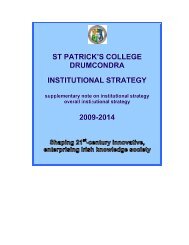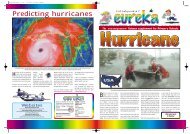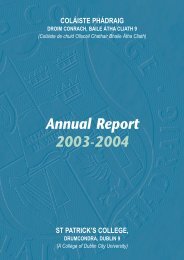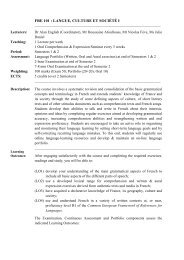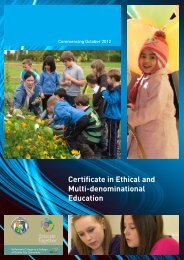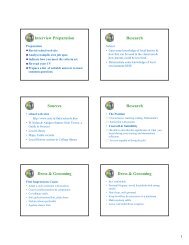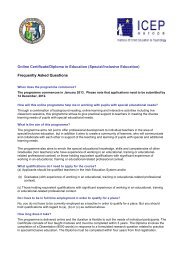BA Degree In Humanities 2012-2013 - St. Patrick's College - DCU
BA Degree In Humanities 2012-2013 - St. Patrick's College - DCU
BA Degree In Humanities 2012-2013 - St. Patrick's College - DCU
You also want an ePaper? Increase the reach of your titles
YUMPU automatically turns print PDFs into web optimized ePapers that Google loves.
Coláiste Phádraig<br />
Droim Conrach<br />
Baile Átha Cliath 9<br />
<strong>St</strong> Patrick’s <strong>College</strong><br />
Drumcondra, Dublin 9<br />
<strong>BA</strong> <strong>Degree</strong> <strong>In</strong> <strong>Humanities</strong><br />
<strong>BA</strong> sa Léann Daonna<br />
<strong>2012</strong>-<strong>2013</strong>
COLÁISTE PHÁDRAIG, DROIM CONRACH, <strong>BA</strong>ILE ÁTHA CLIATH 9, ÉIRE<br />
(COLÁISTE DE CHUID OLLSCOIL CHATHAIR BHAILE ÁTHA CLIATH)<br />
<strong>BA</strong> SA LÉANN DAONNA<br />
<strong>BA</strong> DEGREE IN HUMANITIES<br />
<strong>2012</strong>/<strong>2013</strong><br />
ST PATRICK’S COLLEGE, DRUMCONDRA, DUBLIN 9, IRELAND<br />
(A COLLEGE OF DUBLIN CITY UNIVERSITY)
2 De réir comhaontú nua nascála institiúide (1993, athbhreithnithe 2008), tá<br />
Coláiste Phádraig ainmnithe mar Choláiste de chuid Ollscoil Chathair Bhaile Átha<br />
Cliath agus tá mic léinn an Choláiste ina mic léinn de chuid na hOllscoile. Mic léinn<br />
a dhéanann cúrsaí de chuid an Choláiste atá leagtha síos a chríochnú go sásúil,<br />
bronnann an Ollscoil céimeanna, dioplómaí agus teastais orthu de réir na gcúrsaí<br />
sin.<br />
<strong>In</strong> accordance with an institutional linkage agreement (1993, revised 2008),<br />
<strong>St</strong> <strong>Patrick's</strong> <strong>College</strong> is designated a <strong>College</strong> of Dublin City University and students<br />
of the <strong>College</strong> are students of the University. <strong>St</strong>udents who satisfactorily complete<br />
prescribed <strong>College</strong> courses are conferred with appropriate degrees, diplomas and<br />
certificates by the University.
Contents<br />
<strong>In</strong>troduction 4<br />
<strong>BA</strong> <strong>In</strong>ternational <strong>Degree</strong> 5<br />
<strong>Degree</strong> <strong>St</strong>ructure 7<br />
Subject Choice 7<br />
3<br />
Entry Requirements 9<br />
Selection Process 9<br />
FETAC <strong>St</strong>udents 11<br />
How to Apply 11<br />
Higher Education Access Route (HEAR) 12<br />
Deferred Entry 13<br />
<strong>St</strong>udent Accommodation 14<br />
Biology & Science Education 15<br />
English 16<br />
French 19<br />
Gaeilge 21<br />
Geography 24<br />
History 26<br />
Human Development 28<br />
Mathematics 30<br />
Music 32<br />
Religious <strong>St</strong>udies 34
<strong>BA</strong> <strong>Degree</strong> in <strong>Humanities</strong> / sa Léann Daonna <strong>2012</strong>/<strong>2013</strong><br />
PD103 <strong>BA</strong> DEGREE IN HUMANITIES<br />
4<br />
The degree of <strong>BA</strong> in <strong>Humanities</strong> is a vibrant and exciting programme that<br />
engages with many of the central knowledge-areas shaping the world around<br />
us. Pursuing the <strong>BA</strong> in <strong>Humanities</strong> degree equips students with a range of key<br />
skills for understanding, interpreting, and contributing to modern society.<br />
Each subject-area provides students with an opportunity to gain an in-depth<br />
knowledge and understanding of a particular academic discipline. <strong>In</strong> the<br />
course of being introduced to the knowledge-base and skills which are<br />
intrinsic to each discipline, students are invited to read widely, critically and<br />
perceptively, and to reflect on their reading and articulate their responses to<br />
the challenges posed by these areas of study.<br />
The degree provides students with an opportunity to develop intellectually and<br />
personally, and to gain the kinds of transferable skills that are at the centre of<br />
today’s world of work. The intellectual, social and aesthetic experience which<br />
the degree provides enables students to adapt readily to different contexts;<br />
students graduate as confident and articulate persons, responsive to the needs<br />
of a changing world. Throughout the three-year course in <strong>Humanities</strong>,<br />
students are given an opportunity to pursue a variety of interests and thus to<br />
experience the academic and personal satisfaction that is so crucial to thirdlevel<br />
study. Regular contact between staff and students facilitates learning as<br />
a personal venture and enables students to become independent and creative<br />
thinkers.<br />
The degree qualifies students to undertake a variety of positions and<br />
responsibilities in areas such as communication, education and management.<br />
It also provides an excellent basis for enterprising and imaginative endeavour<br />
in the spheres of cultural, social and civic activity.<br />
PD103 AN CHÉIM <strong>BA</strong> SA LÉANN DAONNA<br />
Is clár bríomhar, mealltach an chéim <strong>BA</strong> sa Léann Daonna, a théann i ngleic<br />
le go leor de na réimsí lárnacha eolais a mhúnlaíonn an domhan thart<br />
timpeall orainn. Má leanann mic léinn an chéim seo, sealbhóidh siad réimse<br />
scileanna a chuirfidh ar a gcumas saol na nua-aoise a thuiscint agus a<br />
láimhseáil chun go mbeidh siad féin in ann cur leis an saol sin. Cuireann gach<br />
ábhar deis ar fáil do mhic léinn eolas agus tuiscint ar leith a bhaint amach sa<br />
réimse áirithe sin. Agus iad á mealladh isteach sa saol acadúil, nochtfar<br />
dóibh scileanna agus foinsí eolais a bhaineann go dlúth leis an ábhar.
<strong>BA</strong> <strong>Degree</strong> in <strong>Humanities</strong> / sa Léann Daonna <strong>2012</strong>/<strong>2013</strong><br />
Foghlaimeoidh siad conas raon leathan ábhair a léamh ar shlí chriticiúil,<br />
thuisceanach agus machnamh a dhéanamh air chun go mbeidh ar a gcumas<br />
freagairt do na dúshláin a chasfar orthu agus an clár idir lámha acu.<br />
Tabharfar deis do mhic léinn trí mheán na céime seo a n-intleacht agus a<br />
bpearsantacht a fhorbairt, agus scileanna inaistrithe a shealbhú a luíonn ag<br />
croílár shaol oibre na linne seo. Tiocfaidh siad i dtír go réidh ar<br />
chomhthéacsanna éagsúla saoil de bharr na taithí intleachtúla, sóisialta,<br />
aeistéitiúla a bhainfidh siad as an gclár staidéir. Fágfaidh mic léinn an<br />
Coláiste ina ndaoine muiníneacha, deisbhéalacha ar féidir leo dul i ngleic le<br />
riachtanais an tsaoil. Beidh faill acu éagsúlacht spéise a fhiosrú agus an<br />
tairbhe acadúil, phearsanta a bhaineann go dlúth leis an staidéar tríú<br />
leibhéal a bhlaiseadh. Éascóidh an teagmháil rialta idir an fhoireann acadúil<br />
agus na mic léinn an fhoghlaim mar thuras pearsanta agus ginfear cumas<br />
machnaimh cruthaitheach agus neamhspleách iontu dá bharr sin.<br />
5<br />
Cumasaíonn an chéim seo mic léinn le dul i mbun réimse leathan freagrachtaí<br />
agus postanna, m.sh.: an chumarsáid, an t-oideachas agus an bhainistíocht.<br />
Forbraítear dúshraith iontach iontu an iarracht fhiontraíoch, shamhlaitheach<br />
a chleachtadh i raon leathan gníomhaíochtaí cultúrtha, sóisalta agus<br />
sibhialta.<br />
<strong>BA</strong> INTERNATIONAL DEGREE<br />
<strong>St</strong>udents may apply to study abroad for a full year following the completion<br />
of their second year on the <strong>BA</strong> in <strong>Humanities</strong> programme. During the<br />
international year in a partner institution abroad students take courses<br />
approved by their departments in <strong>St</strong> Patrick’s <strong>College</strong>. On returning to <strong>College</strong><br />
for their fourth year they take the final year courses in the <strong>BA</strong> programme and<br />
on successful completion are awarded the degree of <strong>BA</strong> (<strong>In</strong>ternational).<br />
The <strong>BA</strong> (<strong>In</strong>ternational) degree gives students the opportunity to enrich their<br />
education by undertaking part of their course abroad. <strong>St</strong>udents who have<br />
participated in the past in this programme have found their international year<br />
to be educationally, culturally and socially fulfilling. Career opportunities both<br />
at home and abroad can be enhanced by the academic and personal<br />
experience gained.<br />
Opportunities exist also for students to spend one semester studying abroad<br />
as part of the three-year <strong>BA</strong> programme.
<strong>BA</strong> <strong>Degree</strong> in <strong>Humanities</strong> / sa Léann Daonna <strong>2012</strong>/<strong>2013</strong><br />
Partner institutions<br />
6<br />
Europe: <strong>St</strong> Patrick’s <strong>College</strong> has links with colleges in Austria, Belgium,<br />
Bulgaria, Czech Republic, Finland, France, Hungary, Lithuania,<br />
Netherlands, Northern Ireland, Norway, Poland, Spain, Sweden and<br />
Switzerland. For students going to a college in Europe that has an Erasmus<br />
University Charter, they receive an Erasmus grant to cover a significant<br />
amount of expenses.<br />
USA: <strong>College</strong> linkages include Colorado - University of Northern Colorado,<br />
California - Chico <strong>College</strong>, and the University of Mississippi.<br />
Japan: Our main link here is at Baiko Gakuin University.<br />
<strong>In</strong>formation and application details are available from the <strong>College</strong><br />
<strong>In</strong>ternational Affairs Office:<br />
www.spd.dcu.ie/international<br />
Coordinator: Dr Gerry O’Reilly<br />
Administrator: Ms Kathleen Gordon<br />
Email: <strong>In</strong>ternationalaffairs@spd.dcu.ie<br />
Phone: + 353 1 884 2239
<strong>BA</strong> <strong>Degree</strong> in <strong>Humanities</strong> / sa Léann Daonna <strong>2012</strong>/<strong>2013</strong><br />
<strong>Degree</strong> <strong>St</strong>ructure<br />
The <strong>BA</strong> in <strong>Humanities</strong> is a three-year Honours <strong>Degree</strong> Level 8 programme. The<br />
structure of the course is 3, 2, 2, i.e. students take three subjects in first year,<br />
two in second year and two in third year.<br />
First Year<br />
<strong>St</strong>udents select three subjects from the following: Biology and Science<br />
Education (BaSE) (First Year only), English, French, Gaeilge, Geography,<br />
History, Human Development, Mathematics, Music, Religious <strong>St</strong>udies.<br />
7<br />
Second and Third Year<br />
<strong>St</strong>udents select two of the subjects taken in First Year.<br />
Subject Choice<br />
First Year<br />
<strong>St</strong>udents take three subjects from<br />
1. English<br />
2. Gaeilge<br />
3. Human Development<br />
4. History or Mathematics or Music or<br />
*Biology and Science Education (BaSE)<br />
5. French or Geography or Religious <strong>St</strong>udies<br />
Second Year<br />
<strong>St</strong>udents continue with two of the subjects studied in First Year.<br />
Third Year<br />
<strong>St</strong>udents continue with the two subjects studied in Second Year.<br />
*Biology and Science Education is First Year only
<strong>BA</strong> <strong>Degree</strong> in <strong>Humanities</strong> / sa Léann Daonna <strong>2012</strong>/<strong>2013</strong><br />
Subject Combinations and Options<br />
Some constraints on subject combinations are necessary owing to timetabling.<br />
The availability of any subject or option within it will depend on a minimum<br />
enrolment.<br />
8<br />
A maximum enrolment will apply to some options within subjects. Not all<br />
optional courses within subjects will be offered each year.<br />
European Credit Transfer System (ECTS)<br />
ECTS credits reflect the workload a typical student needs to complete in order<br />
to achieve the expected learning outcomes in a programme, subject or<br />
module. This workload includes lectures, seminars, workshops, laboratory<br />
sessions, fieldwork, private study, examinations and other assessments. A fulltime<br />
academic year of study normally equates to a rating of 60 credits.<br />
Each of the three subjects in first year is allocated 20 credits, while in second<br />
and third years each subject is assigned 30 credits.<br />
Assessment<br />
Written and, where appropriate, oral examinations are held at the end of<br />
each semester/year. A proportion of marks, not exceeding 50% in any<br />
subject, may be assigned for written/practical/tutorial work during the<br />
course.
<strong>BA</strong> <strong>Degree</strong> in <strong>Humanities</strong> / sa Léann Daonna <strong>2012</strong>/<strong>2013</strong><br />
Minimum Entry Requirements<br />
Leaving Certificate<br />
• Grade C3 in two Higher Level subjects and Grade D3 in four Ordinary, or<br />
Higher Level subjects (which must include Mathematics and either English or<br />
Irish).<br />
• The <strong>College</strong> does not award points for the subject of Mathematics at<br />
Foundation Level or at Ordinary Alternative Level. This subject will be<br />
accepted for matriculation purposes.<br />
9<br />
General Certificate in Education<br />
(United Kingdom and Overseas)<br />
<strong>In</strong> order to meet the general entry requirements students must meet one of the<br />
following:<br />
• 2 x Grade C at GCE A Level plus 4 x Grade C at GCSE Level which<br />
must include the subjects Mathematics and English (or Irish)<br />
• 2 x Grade C at GCE A Level plus 2 x Grade C at GCE AS Level plus<br />
2 x Grade C at GCSE Level which must include the subjects<br />
Mathematics and English (or Irish)<br />
• 2 x Grade C at GCE A Level plus 1 x Grade C at GCE AS Level plus<br />
3 x Grade C at GCSE Level which must include the subjects<br />
Mathematics and English (or Irish)<br />
Selection Process<br />
Leaving Certificate<br />
Applicants are placed in order of merit based on their six best subjects in one<br />
sitting of the Leaving Certificate examination, on the basis of the following points<br />
system:<br />
From <strong>2012</strong> on a pilot basis, 25 bonus points will be added to the Leaving<br />
Certificate Higher Level Mathematics points score for grade D3 or above.
<strong>BA</strong> <strong>Degree</strong> in <strong>Humanities</strong> / sa Léann Daonna <strong>2012</strong>/<strong>2013</strong><br />
General Certificate in Education<br />
(2006 onwards)<br />
Having satisfied the entry requirements and subject entry requirements candidates<br />
are ranked for admission on the basis of a score calculated on the basis of either:<br />
10<br />
• The best four GCE A Level grades from one academic year<br />
or<br />
• The best three GCE A Level grades from one year plus one AS Level grade in<br />
a different subject from the same or preceding year only<br />
The points that apply to each grade (from 2010) are indicated in the following<br />
table:<br />
Grade A A B C D E<br />
A Level 150 135 120 100 75 40<br />
AS Level 65 60 50 35 20<br />
From <strong>2012</strong> on a pilot basis, 25 bonus points will be added for one A level<br />
Mathematics subject.<br />
Leaving Certificate Vocational Programme<br />
<strong>St</strong> <strong>Patrick's</strong> <strong>College</strong> awards points as set out below for results in Leaving Certificate<br />
Vocational Programme Link Modules, in place of a sixth Leaving Certificate<br />
subject:<br />
Distinction 70 Merit 50 Pass 30<br />
The Link Modules will not qualify as a subject for Matriculation purposes.<br />
Mature <strong>St</strong>udents<br />
Where mature students do not meet the above minimum requirements, satisfactory<br />
evidence of ability to pursue and profit from the programme will be required. This<br />
includes an applicant being called for interview and short written test.
<strong>BA</strong> <strong>Degree</strong> in <strong>Humanities</strong> / sa Léann Daonna <strong>2012</strong>/<strong>2013</strong><br />
FETAC <strong>St</strong>udents<br />
<strong>St</strong>udents with appropriate FETAC Level 5 qualifications, with distinctions in at least<br />
five modules (components), may be admitted on a competitive basis to the first<br />
year of the <strong>BA</strong> in <strong>Humanities</strong> programme. There will be up to 5 places available.<br />
Entry Requirements<br />
1. Full FETAC Level 5 Certificate in one of the following:<br />
Course Code<br />
Title<br />
11<br />
5M2154/ECHSX<br />
5M2073/ELESX<br />
5M2464<br />
ELAXX<br />
EPJXX<br />
Cultural and Heritage <strong>St</strong>udies<br />
Language and European <strong>St</strong>udies<br />
Journalism<br />
Liberal Arts<br />
Print Journalism<br />
2. For further information go to the Admissions Office website:<br />
www.spd.dcu.ie/fetacstudents<br />
How to Apply<br />
Applicants (other than Mature Applicants) must apply directly to the Central<br />
Applications Office (CAO). Application literature is available from<br />
CAO, Tower House, Eglington <strong>St</strong>reet, Galway.<br />
Tel. (091)-509800; Fax. (091)-562344 Web Address: www.cao.ie<br />
CAO Course Code: PD103<br />
Mature <strong>St</strong>udents<br />
Mature students may apply directly to the <strong>College</strong>. Mature students must be<br />
23 years of age or more on 1st January in year of entry. Application forms are<br />
available mid February <strong>2013</strong> and completed application forms should be returned<br />
by 2nd April <strong>2013</strong>.<br />
Please note that mature students may apply either through the CAO system or<br />
through the mature students’ competition or both.
<strong>BA</strong> <strong>Degree</strong> in <strong>Humanities</strong> / sa Léann Daonna <strong>2012</strong>/<strong>2013</strong><br />
12<br />
Higher Education Access Route (HEAR)<br />
The Higher Education Access Route (HEAR) is a third level admissions scheme<br />
for school leavers from socio-economically disadvantaged backgrounds.<br />
HEAR has been established by a number of Higher Education <strong>In</strong>stitutions<br />
based on clear evidence that socio-economic disadvantage has a negative<br />
impact on educational achievement at school and progression to higher<br />
education.<br />
School leavers who provide satisfactory evidence relating to their socioeconomic<br />
circumstances and meet the Irish Leaving Certificate matriculation /<br />
minimum entry and subject requirements are eligible to compete for a quota<br />
of places allocated to applicants on a reduced points basis in <strong>St</strong> Patrick’s<br />
<strong>College</strong>.<br />
Who should apply to HEAR?<br />
HEAR is for school leavers (under 23 years old as of 1 January <strong>2013</strong>).<br />
Mature and FETAC students have different admission routes.<br />
<strong>In</strong>formation on these routes is available from the Admissions<br />
Office/Mature <strong>St</strong>udents Office.<br />
How to apply to HEAR?<br />
1 Apply online to CAO by 17:15 on 1 February <strong>2013</strong>.<br />
2 No later than 17:15 on 1 March <strong>2013</strong>, you must indicate in<br />
your CAO application that you wish to apply for the HEAR<br />
scheme and you must fully and correctly complete all elements of<br />
the HEAR form (the HEAR form is a part of your CAO<br />
application).<br />
3 Submit relevant evidence in support of your application to arrive<br />
at CAO no later than 17:15 on 1 April <strong>2013</strong>.<br />
HEAR applications can only be made online at www.cao.ie.<br />
Further information on HEAR is available from your school Guidance<br />
Counsellor or Vivienne Byrne, Access Officer -<br />
Email: vivienne.byrne@spd.dcu.ie or Tel: 01 884 2169<br />
<strong>In</strong>formation can also be found on:<br />
www.accesscollege.ie<br />
www.cao.ie<br />
www.spd.dcu.ie/access
<strong>BA</strong> <strong>Degree</strong> in <strong>Humanities</strong> / sa Léann Daonna <strong>2012</strong>/<strong>2013</strong><br />
Condition of a HEAR Offer<br />
<strong>St</strong>udents who receive a HEAR offer must attend an orientation<br />
programme before the first semester.<br />
<strong>St</strong>udents who accept places in <strong>St</strong> Patrick’s <strong>College</strong> through HEAR are<br />
offered a variety of academic, personal and social supports while<br />
studying at third level. Details of post-admission supports for HEAR<br />
entrants can also be found on:<br />
13<br />
www.accesscollege.ie<br />
www.spd.dcu.ie/access<br />
Deferred Entry<br />
An applicant who is offered a place may defer entry for only one year under<br />
certain circumstances. The following procedures apply:<br />
On receipt of offer notice from the CAO:<br />
• The applicant should not accept the offer<br />
• Write or email (admissions.office@spd.dcu.ie) immediately to the<br />
Admissions Office setting out the reason(s) for the request. Give your<br />
name as it appears on your CAO application, quote your <strong>2013</strong> CAO<br />
application number and the course code of the offer you wish to defer. Mark<br />
“Deferred Entry” clearly on the envelope or in the subject line of your email.<br />
• The letter or email must arrive in the Admissions Office at least two days<br />
before the “Reply Date” shown on the CAO Offer Notice.<br />
• The <strong>College</strong> will communicate the decision to the applicant. If the deferral is<br />
not granted, the offer may still be accepted for the current year.<br />
<strong>In</strong> order to take up the deferred place, the applicant must reapply through the<br />
CAO by the 1st February in the succeeding year, placing the deferred course as<br />
their one and only choice on the CAO Application Form. If an applicant fails<br />
in either respect, the deferral guarantee is forfeited and an applicant enters the<br />
competition for places in the normal way.
<strong>BA</strong> <strong>Degree</strong> in <strong>Humanities</strong> / sa Léann Daonna <strong>2012</strong>/<strong>2013</strong><br />
<strong>St</strong>udent Grants<br />
14<br />
A new online only grant applications system is being introduced for <strong>2012</strong>. All<br />
new applications will be made online to a single awarding authority, <strong>St</strong>udent<br />
Universal Support Ireland (SUSI) through www.studentfinance.ie .The details of<br />
the <strong>2012</strong> <strong>St</strong>udent Grant Scheme are due to be announced in May and the SUSI<br />
online application system will be available from that date. <strong>St</strong>udents can continue<br />
to check www.studentfinance.ie for information and updates in the meantime.<br />
<strong>St</strong>udent Accommodation<br />
The <strong>College</strong> has residential accommodation for approximately 230 students.<br />
<strong>In</strong>coming first year students from outside Dublin seeking on-campus<br />
accommodation can apply after receiving their CAO offer. Applications must be<br />
made online (www.spd.dcu.ie/accommodation). Rooms will then be allocated by<br />
lottery and applicants will be notified as soon as possible. The <strong>St</strong>udents' Union<br />
will provide a list of off-campus accommodation in September -<br />
direct line: (01) 884 2230, www.stpatssu.com<br />
Open Day<br />
Open Day provides an opportunity to showcase the <strong>College</strong> to prospective<br />
students and their families. Our Open Day will be held in the <strong>College</strong> on Saturday<br />
17 November, <strong>2012</strong>. Details are forwarded to schools in October. <strong>St</strong>udents and<br />
parents are welcome to attend to meet current students and academic staff. For<br />
full details go to www.spd.dcu.ie/openday
<strong>BA</strong> <strong>Degree</strong> in <strong>Humanities</strong> / sa Léann Daonna <strong>2012</strong>/<strong>2013</strong><br />
BIOLOGY and SCIENCE EDUCATION (BaSE)<br />
First Year only<br />
The Biology and Science Education course is aimed at students who have an enthusiasm<br />
for science and scientific inquiry, and who wish to understand the role that science can<br />
play in society, focussing on educational contexts. The course especially aims to develop<br />
students’ own biological knowledge and understanding, such as current issues in<br />
biology, including aspects of botany, zoology, ecology and cell biology. <strong>In</strong> addition,<br />
students are introduced to fundamental principles in physics and chemistry as well as<br />
developing an awareness of key issues relating to school science and scientific literacy.<br />
Assessment is by continuous assessment, assignments and projects, and practical and<br />
written examinations.<br />
15<br />
As all topics start from first principles, no prior scientific knowledge is required –<br />
however, students should have an enthusiasm for practical work, discussion and debate.<br />
<strong>St</strong>udents take all courses to accumulate 20 credits.<br />
All courses extend across both semesters.<br />
<strong>BA</strong>SE 101<br />
<strong>BA</strong>SE 102<br />
<strong>BA</strong>SE 103<br />
<strong>BA</strong>SE 104<br />
Fundamentals in science (5 credits)<br />
Environmental systems (5 credits)<br />
Diversity in plants and animals (5 credits)<br />
<strong>In</strong>troduction to cell biology, biochemistry and genetics<br />
(5 credits)<br />
For further details, see the Department’s website:<br />
www.spd.dcu.ie/biology
<strong>BA</strong> <strong>Degree</strong> in <strong>Humanities</strong> / sa Léann Daonna <strong>2012</strong>/<strong>2013</strong><br />
ENGLISH<br />
16<br />
<strong>St</strong>udents of English engage with a wide range of literature, with a particular emphasis on<br />
works by Irish, English and American writers. During the three year programme students<br />
become familiar with the characteristics and contexts of drama, poetry and fiction,<br />
studying texts from the 16th century to the present moment. <strong>In</strong> doing so, students acquire<br />
the critical tools with which to read a literary text and develop their fluency and skills in<br />
language and expression. Central to the aims of the department is the promotion and<br />
development in our students of independent critical thinking and an appreciation of the<br />
aesthetic. These aims are facilitated by lectures and small group teaching that includes<br />
weekly tutorials in all years, elective seminars in second year and Research Seminars in<br />
third year leading to the writing of a thesis. As part of the thesis writing process in third<br />
year, students work one-to-one with a supervisor from the academic staff. The department<br />
is committed to fostering creative thinking in its students and holds creative writing options<br />
in all years. Third year students have the opportunity of working with the John McGahern<br />
Writer in Residence.<br />
Assessment: exam; essay; project; third year thesis.<br />
There are no specific subject entry requirements for those who wish to study English<br />
except perhaps a love of reading.<br />
The courses listed below may be subject to change in <strong>2012</strong>-<strong>2013</strong>.<br />
First Year - 20 credits<br />
<strong>BA</strong> students take all courses<br />
First Semester<br />
ENG 101 Poetry and Possibility (2.5 credits)<br />
ENG 102 <strong>In</strong>troduction to Drama (2.5 credits)<br />
ENG 103 <strong>In</strong>troduction to Fiction: the Short <strong>St</strong>ory (2.5 credits)<br />
ENG 107 Language and analysis/writing seminar (2.5 credits)<br />
(To be taken in both semesters)<br />
Second Semester<br />
ENG 104 Irish Writing Now and Then (2.5 credits)<br />
ENG 105 Research Skills and Critical Approaches (2.5 credits)<br />
ENG 106 Fiction: What’s Novel about the Novel? (2.5 credits)<br />
ENG 108 Creative Writing Project<br />
ENG 107 Language and analysis/writing seminar (2.5 credits)<br />
(To be taken in both semesters)
<strong>BA</strong> <strong>Degree</strong> in <strong>Humanities</strong> / sa Léann Daonna <strong>2012</strong>/<strong>2013</strong><br />
Second Year - 30 credits<br />
<strong>BA</strong> students take all courses<br />
First Semester<br />
ENG 201 Creating Childhood: Writers and Texts in the<br />
Nineteenth Century (3 credits)<br />
ENG 202 Shakespeare (3 credits)<br />
ENG 204 Decadence and Late Nineteenth-Century Literature (3 credits)<br />
ENG 208 English Renaissance Poetry (3 credits)<br />
ENG 209 Irish Theatre (3 credits)<br />
ENG 207 Language and analysis/writing seminar<br />
(To be taken in both semesters)<br />
17<br />
Second Semester<br />
ENG 203 Radicals and Rebels in the Romantic Period (3 credits)<br />
ENG 205 American Literature: American Dreams (3 credits)<br />
ENG 206 Irish Writing: Nation and Imagination (3 credits)<br />
ENG 210 Empire and Writing (3 credits)<br />
ENG 211 Special Options and Creative Writing Option<br />
(<strong>St</strong>udents choose a seminar from diverse literary topics) (3 credits)<br />
ENG 207 Language and analysis/writing seminar<br />
(To be taken in both semesters)<br />
Third Year - 30 credits<br />
<strong>BA</strong> students take all courses.<br />
First Semester<br />
ENG 302 Modernisms (3 credits)<br />
ENG 303 Research Seminar: Option (3 credits)<br />
ENG 305 Postcolonial Writing (3 credits)<br />
ENG 308 New Prospects in Contemporary Irish Writing (3 credits)<br />
ENG 309 American Gothic (3 credits)<br />
ENG 307 Language and analysis/writing seminar<br />
(To be taken in both semesters)
<strong>BA</strong> <strong>Degree</strong> in <strong>Humanities</strong> / sa Léann Daonna <strong>2012</strong>/<strong>2013</strong><br />
18<br />
Second Semester<br />
ENG 301 Modern Drama (3 credits)<br />
ENG 304 Children’s Literature: The Playgrounds of Childhood<br />
(3 credits)<br />
ENG 306 Research Seminar: Thesis (3 credits)<br />
ENG 310 Comedy, Fantasy and Satire: 1 (Drama) (3 credits)<br />
ENG 311 Comedy, Fantasy and Satire: 2 (Prose) (3 credits)<br />
ENG 312 Creative Writing Workshop (By application. <strong>St</strong>udents accepted<br />
on to this course do not take ENG 311) (3 credits)<br />
ENG 307 Language and analysis/writing seminar<br />
(To be taken in both semesters)<br />
For further details, see the Department’s website:<br />
www.spd.dcu.ie/english
<strong>BA</strong> <strong>Degree</strong> in <strong>Humanities</strong> / sa Léann Daonna <strong>2012</strong>/<strong>2013</strong><br />
FRENCH<br />
The undergraduate course provides students with a comprehensive introduction to important<br />
aspects of modern France, including its literature and culture in the context of French society<br />
as a whole. Some consideration is also given to the position of France in a wider context, in<br />
terms both of Europe and the wider Francophone world. Considerable emphasis is placed<br />
on the development of students’ capacities in the use of the French language: full use of stateof-the-art<br />
language laboratory resources combined with personal study and research, the<br />
development of a language portfolio and continuous work and practice in the written word<br />
allow for the acquisition of a high-level of competence in spoken and written French.<br />
<strong>St</strong>udents are encouraged to spend time in France by participating in one of a number of<br />
mobility programmes.<br />
19<br />
The <strong>BA</strong> programme includes an introduction to research over two years in various areas of<br />
modern French literature and leads in the final year to the production of a dissertation on a<br />
literary topic under expert supervision.<br />
<strong>St</strong>udents should have attained a minimum of Grade B in Higher level Leaving Certificate<br />
French or equivalent.<br />
The courses listed below may be subject to change in <strong>2012</strong>-13.<br />
Unless otherwise indicated, the modules below are one-semester courses<br />
First Year - 20 credits<br />
<strong>St</strong>udents take all courses.<br />
FR 101 Language and Written Expression I (2 Semesters) (6 credits)<br />
FR 102 Oral Comprehension and Expression I (2 Semesters) (4 credits)<br />
FR 103 Text, Image and Culture I (4 credits)<br />
FR 104 Text, Image and Culture II (4 credits)<br />
FR 105 Language Portfolio I (2 Semesters) (2 credits)<br />
Second Year - 30 credits<br />
<strong>St</strong>udents take all courses.<br />
FR 201 Language and Written Expression II (2 Semesters) (6 credits)<br />
FR 202 Oral Comprehension and Expression II (2 Semesters) (4 credits)<br />
FR 203 <strong>In</strong>troduction to Linguistics (3 credits)
<strong>BA</strong> <strong>Degree</strong> in <strong>Humanities</strong> / sa Léann Daonna <strong>2012</strong>/<strong>2013</strong><br />
20<br />
FR 204<br />
FR 205<br />
FR 206<br />
FR 207<br />
FR 208<br />
FR 209<br />
<strong>In</strong>troduction to French Cinema (3 credits)<br />
Classicism and Experimentation in French Theatre (3 credits)<br />
The 19th-century French Short <strong>St</strong>ory (3 credits)<br />
Texts and the Cinema of the Années noires (3 credits)<br />
<strong>BA</strong> Option course (3 credits)<br />
Language Portfolio II (2 semesters) (2 credits)<br />
Third Year - 30 credits<br />
<strong>St</strong>udents take all courses.<br />
FR 301 Language and Written Expression III (2 semesters) (6 credits)<br />
FR 302 Oral Comprehension and Expression III (2 semesters) (5 credits)<br />
FR 303 Modernity in 19th-century French Literature & Art (2.5 credits)<br />
FR 304 Autour de Paris : images and texts of la banlieue (2.5 credits)<br />
FR 305 Research Dissertation on a Literary Topic (2 semesters) (5 credits)<br />
FR 306 Second Language Acquisition (2.5 credits)<br />
FR 307 Memory & Identity (2.5 credits)<br />
FR 308 <strong>BA</strong> Option Course (2 credits)<br />
FR 309 Language Portfolio III (2 semesters) (2 credits)<br />
For further details, see the Department's website:<br />
www.spd.dcu.ie/french
<strong>BA</strong> <strong>Degree</strong> in <strong>Humanities</strong> / sa Léann Daonna <strong>2012</strong>/<strong>2013</strong><br />
GAEILGE<br />
Scrúdaítear teanga, litríocht agus cultúr na Gaeilge ina gcomhthéacsanna staire agus<br />
comhaimseartha le linn an chúrsa Nua-Ghaeilge seo.<br />
Is é aidhm an chúrsa léargas leathan a thabhairt do na mic léinn ar na príomhghnéithe den<br />
traidisiún liteartha agus béil, ar fhorbairt na seánraí, ar an nGaeilge sna meáin chumarsáide<br />
agus mar ghné den timpeallacht chultúrtha, agus ar staid shochtheangeolaíoch<br />
chomhaimseartha na teanga. Féachtar le hinniúlachtaí léitheoireachta, scríbhneoireachta,<br />
anailíse agus critice na mac léinn a fhorbairt trí théacsanna agus acmhainní foghlama<br />
ilghnéitheacha a chur faoina mbráid sna cúrsaí éagsúla léachta. Déantar na scileanna<br />
teanga – éisteacht, labhairt, léamh agus scríobh – a chleachtadh trí chúrsa comhtháite<br />
teanga a chur ar fáil sna seimineáir. Trí na príomhfhoinsí eolais agus tagartha i réimsí<br />
éagsúla de léann na Gaeilge a chur faoina mbráid agus a phlé, féachtar le cumas<br />
machnaimh agus le scileanna taighde na mac léinn a chleachtadh agus a fhorbairt ar<br />
bhealach a rachaidh chun tairbhe dóibh agus iad ag feidhmiú go gairmiúil trí mheán na<br />
Gaeilge. Tá sé mar aidhm ag an gcúrsa go mbeidh na saintuiscintí teangeolaíochta,<br />
sochtheangeolaíochta agus cultúir ag céimithe <strong>BA</strong> le Gaeilge a chuideoidh leo i réimse<br />
gairmeacha le Gaeilge, agus a bheadh mar bhonn don staidéar iarchéime san ábhar.<br />
21<br />
Moltar go mbeadh C3 (Ardleibhéil) san Ardteistiméireacht, nó a chomhionann, ag mic léinn.<br />
An Chéad Bhliain (20 creidiúint)<br />
Déanann mic léinn gach ceann de na seacht modúl. Múintear GAE 107 sa dá<br />
sheimeastar.<br />
Seimeastar 1<br />
GAE 101 An Béal Beo 1: An Scéalaíocht Thraidisiúnta (2.5 creidiúint)<br />
GAE 102 Meáin Chumarsáide na Gaeilge 1:<br />
Scannáin agus Drámaí Teilifíse (2.5 creidiúint)<br />
GAE 103 An Nualitríocht 1: An Ficsean Comhaimseartha (2.5 creidiúint)<br />
Seimeastar 2<br />
GAE 104 An Béal Beo 2: Caoineadh Airt Uí Laoghaire (2.5 creidiúint)<br />
GAE 105 Léitheoireacht agus Láithriú (2.5 creidiúint)<br />
GAE 106 An Nualitríocht 2: Saothar an Phiarsaigh (2.5 creidiúint)<br />
GAE 107<br />
Seimineár Teanga (Dhá uair an chloig sa tseachtain gach<br />
seimeastar) (5 creidiúint)
<strong>BA</strong> <strong>Degree</strong> in <strong>Humanities</strong> / sa Léann Daonna <strong>2012</strong>/<strong>2013</strong><br />
An Dara Bliain (30 creidiúint)<br />
Déanann mic léinn gach ceann de na deich modúl. Déantar GAE 210 sa dá<br />
sheimeastar.<br />
22<br />
Seimeastar 1<br />
GAE 201 An Nualitríocht 3: An Fhilíocht Chomhaimseartha (2.5 creidiúint)<br />
GAE 202 Scéalta agus Scannáin 1: Litríocht an Taistil (2.5 creidiúint)<br />
nó<br />
Saoithiúlacht na Gaeilge 1: Amhráin na Gaeilge (2.5 creidiúint)<br />
GAE 203 Foinn agus Filíocht 1: Litríocht an 17ú hAois (2.5 creidiúint)<br />
GAE 204 Seánraí na Gaeilge 1: An Dialann sa Ghaeilge (2.5 creidiúint)<br />
Seimeastar 2<br />
GAE 205 Ainmneacha Áiteanna agus Ainmneacha Daoine (2.5 creidiúint)<br />
GAE 206 An Nualitríocht 4: Litríocht na nÓg (2.5 creidiúint)<br />
GAE 207 Foinn agus Filíocht 2: Filíocht agus Ceol an 18ú hAois<br />
(2.5 creidiúint)<br />
GAE 208 Seánraí na Gaeilge 2: An Fhiannaíocht (2.5 creidiúint)<br />
GAE 209 Scannáin faisnéise na Gaeilge (2.5 creidiúint)<br />
GAE 210<br />
Seimineár Teanga (Dhá uair an chloig sa tseachtain gach<br />
seimeastar) (7.5 creidiúint)<br />
An Tríú Bliain (30 creidiúint)<br />
Déanann mic léinn gach ceann de na deich modúl. Déantar GAE 310 sa dá<br />
sheimeastar.<br />
Seimeastar 1<br />
GAE 301 An Nualitríocht 5: An tÚrscéal Gaeilge (2.5 creidiúint)<br />
GAE 302 An Béal Beo 3: Canúintí na Gaeilge (2.5 creidiúint)<br />
GAE 303 Cúrsa Roghnach (5 creidiúint)<br />
GAE 304 Seánraí na Gaeilge 3: Scéal na Litríochta (2.5 creidiúint)
<strong>BA</strong> <strong>Degree</strong> in <strong>Humanities</strong> / sa Léann Daonna <strong>2012</strong>/<strong>2013</strong><br />
Seimeastar 2<br />
GAE 305 An Nualitríocht 6: Filí Comhaimseartha na Gaeilge (2.5 creidiúint)<br />
nó<br />
An Nualitríocht 6: Saothar na nGriannach (2.5 creidiúint)<br />
GAE 306 An Béal Beo 4: Drámaíocht na Gaeilge (2.5 creidiúint)<br />
GAE 307 An tSochtheangeolaíocht (2.5 creidiúint)<br />
GAE 308 Seánraí na Gaeilge 4: Scéalta Beatha na Gaeilge (2.5 creidiúint)<br />
GAE 309 An Focal Beo: Cúrsa Scríbhneoireachta (2.5 creidiúint)<br />
23<br />
GAE 310<br />
Seimineár Teanga (dhá uair an chloig sa tseachtain gach<br />
seimeastar) (5 creidiúint)<br />
Chun teacht ar thuilleadh eolais, féach ar shuíomh gréasáin na Roinne:<br />
www.spd.dcu.ie/gaeilge<br />
N.B. Is féidir go dtiocfaidh athruithe áirithe ar leagan amach na gcúrsaí seo.<br />
Cuirfear athrú ar bith in iúl do mhic léinn ag an am cuí.
<strong>BA</strong> <strong>Degree</strong> in <strong>Humanities</strong> / sa Léann Daonna <strong>2012</strong>/<strong>2013</strong><br />
GEOGRAPHY<br />
24<br />
Geography is the study of the inter-relationship between people and environments - both<br />
natural and created by people. <strong>In</strong> both narrow and wider senses Geography is all around us.<br />
It may be seen at many levels or scales of environment, from the local through to the global.<br />
Geographers concern themselves with the human and physical elements of those<br />
environments, together with their historical development, spatial organisations, interrelationships,<br />
management and planning.<br />
The nature and sequence of the course in Geography provides students with a framework that<br />
will guide them from an introductory level through to a detailed analysis of topical issues and<br />
themes.<br />
The Geography course will be taught through lectures, tutorials and practical classes and<br />
fieldwork. Emphasis is placed on the development of a variety of skills such as reading and<br />
constructing maps, preparing and carrying out fieldwork and social surveys, writing and<br />
presenting reports.<br />
<strong>St</strong>udents who wish to study Geography as a degree subject do not need to have studied<br />
it previously.<br />
First Year - 20 credits<br />
N.B. Please note that the syllabus below is that which applied in the academic year<br />
2011 –<strong>2012</strong>. Changes may be introduced to the syllabus in <strong>2012</strong>-<strong>2013</strong>. <strong>St</strong>udents will be<br />
notified of these changes at the appropriate time.<br />
<strong>St</strong>udents take all courses<br />
GEOG 101<br />
GEOG 102<br />
GEOG 103<br />
An <strong>In</strong>troduction to Human Geography (7.5 credits)<br />
An <strong>In</strong>troduction to Physical Geography (7.5 credits)<br />
Geographical Skills (5 credits)<br />
All First Year students are required to attend a one-day field trip as part of GEOG<br />
101. This fieldwork will take place before Christmas and students will be<br />
accommodated in smaller groups when going on these trips.<br />
<strong>St</strong>udents will be split into groups for the practical sessions (GEOG 103).<br />
Second Year - 30 credits<br />
N.B. Please note that the syllabus below is that which applied in the academic year<br />
2011 –<strong>2012</strong>. Changes may be introduced to the syllabus in <strong>2012</strong>-<strong>2013</strong>. <strong>St</strong>udents<br />
will be notified of these changes at the appropriate time.
<strong>BA</strong> <strong>Degree</strong> in <strong>Humanities</strong> / sa Léann Daonna <strong>2012</strong>/<strong>2013</strong><br />
<strong>St</strong>udents taking Geography and Human Development take all courses.<br />
GEOG 210 forms part of their course requirements in Human Development and<br />
not Geography.<br />
<strong>St</strong>udents taking Geography but not studying Human Development may<br />
choose between GEOG 210 and GEOG 212. However, please note that GEOG<br />
210 is a prerequisite for GEOG 311 Research Project / Dissertation.<br />
GEOG 203<br />
GEOG 208<br />
GEOG 209<br />
GEOG 210<br />
GEOG 211<br />
GEOG 212<br />
GEOG 215<br />
Geographical Research Methods (5 credits)<br />
Europe and the European Union (5 credits)<br />
The Making of the Irish Landscape (5 credits)<br />
Research Methods 2 (5 credits)<br />
Society, Space and <strong>In</strong>equality (5 credits)<br />
Landscape, Heritage and Identity (5 credits)<br />
Humanitarian Action (5 credits)<br />
25<br />
All Second Year students will be required to complete a one-day field trip<br />
associated with one of the courses taught during Semester 2.<br />
Third Year - 30 credits<br />
N.B. Please note that the syllabus below is that which applied in the academic year<br />
2011 –<strong>2012</strong>. Changes may be introduced to the syllabus in <strong>2012</strong>-<strong>2013</strong>. <strong>St</strong>udents<br />
will be notified of these changes at the appropriate time.<br />
<strong>BA</strong> students choose six of the following courses, and may only choose a maximum<br />
of two of the final three courses (308, 310 and 311).<br />
GEOG 303<br />
GEOG 305<br />
GEOG 306<br />
GEOG 309<br />
GEOG 314<br />
GEOG 308<br />
GEOG 310<br />
GEOG 311<br />
Mediterranean, Middle East and North Africa (5 credits)<br />
Contemporary Geographical Issues (5 credits)<br />
Slums and Suburbs (5 credits)<br />
Historical Geography (5 credits)<br />
Children’s Geographies (5 credits)<br />
<strong>In</strong>ternational Field Course (5 credits)<br />
Water Resources (5 credits)<br />
Research Project / Dissertation (5 credits)<br />
For further details, see the Department's website:<br />
www.spd.dcu.ie/geography
<strong>BA</strong> <strong>Degree</strong> in <strong>Humanities</strong> / sa Léann Daonna <strong>2012</strong>/<strong>2013</strong><br />
HISTORY<br />
This subject aims to give students a familiarity with the major events in History, and to<br />
develop their understanding of the significant issues and trends in the shaping of the<br />
modern world. <strong>In</strong> the process it seeks to enhance students' critical thinking and<br />
expression and to develop their ability to interpret evidence.<br />
26<br />
The History Department offers a wide variety of courses. The emphasis is primarily on<br />
modern Irish, British, European and American history. Most courses are designed to<br />
contain a balance of topics from political, social and economic history. Courses are<br />
taught through lectures, tutorials and seminars. <strong>In</strong> the tutorial system, students meet<br />
weekly in small groups to discuss issues arising from lectures and written work. They<br />
acquire practice in organising and expressing their arguments, both verbally and in<br />
writing. <strong>In</strong> second and third years, students will also present and discuss papers at<br />
seminars.<br />
Detailed course descriptions, reading lists etc. are contained in History Course books<br />
presented to students at the beginning of each year.<br />
Prospective students should note that it is not necessary to have studied history<br />
previously. A large, and growing proportion of students have not taken the subject at<br />
Leaving Certificate level.<br />
The courses listed below may be subject to change in <strong>2012</strong> - <strong>2013</strong>.<br />
First Year<br />
<strong>St</strong>udents take an <strong>In</strong>troductory Module and HIST 101, HIST 102 and Hist 103 to<br />
accumulate 20 credits<br />
<strong>In</strong>troductory Module An <strong>In</strong>troduction to History<br />
HIST 101 From <strong>St</strong>one Age to New Age: the history of the Irish<br />
Landscape (7.5 credits)<br />
HIST 102 Early Modern Europe, 1500-1715 (5 credits)<br />
HIST 103 The World since 1945 (7.5 credits)<br />
Second Year<br />
<strong>St</strong>udents take HIST 201, HIST 202 and two other second-year courses<br />
to accumulate 30 credits<br />
HIST 201<br />
Ireland: from Williamite Conquest to the Great Famine,<br />
1690 -1850 ( 7.5 credits)
<strong>BA</strong> <strong>Degree</strong> in <strong>Humanities</strong> / sa Léann Daonna <strong>2012</strong>/<strong>2013</strong><br />
HIST 202 Europe in the Era of Enlightenment and Revolution,<br />
c.1740 –c.1830 (7.5 credits)<br />
HIST 203 America: From Colony to Nation (7.5 credits)<br />
HIST 204 Early Medieval Ireland 431 - 1169: history and society<br />
HIST 204 (7.5 credits)<br />
HIST 205 <strong>In</strong>troduction to the Atlantic Slave Trade (7.5 credits)<br />
HIST 206 Russia: Reform, Reaction and Revolution 1801 -1929<br />
(7.5 credits)<br />
27<br />
Third Year<br />
<strong>St</strong>udents take HIST 301, HIST 302, a documents course and one option<br />
course offered to third years to accumulate a total of 30 credits<br />
HIST 301<br />
HIST 302<br />
HIST 303<br />
Modern Ireland 1850-2000 (7.5 credits)<br />
Europe, 1870-1950: Society and politics in crisis and change<br />
(7.5 credits)<br />
Herstory: women in Europe from the Renaissance to the<br />
twentieth century (7.5 credits)<br />
HIST 304 America: from Civil War to World Power 1840-1972<br />
(7.5 credits)<br />
Documents Courses (<strong>St</strong>udents choose one from a menu of courses, which<br />
changes from year to year)<br />
HIST 305<br />
HIST 306<br />
HIST 307<br />
HIST 308<br />
HIST 309<br />
HIST 310<br />
Gender, Power and Politics in the Modern World (7.5 credits)<br />
Medieval Archaeology (7.5 credits)<br />
Women and Society in Ireland 1800-1922 (7.5 credits)<br />
Gender, Power and Politics in the Modern World (7.5 credits)<br />
The land question in nineteenth-century Ireland (7.5 credits)<br />
Revolution and Civil War in Ireland, 1916-23 (7.5 credits)<br />
For further details, see the Department's website:<br />
www.spd.dcu.ie/history
<strong>BA</strong> <strong>Degree</strong> in <strong>Humanities</strong> / sa Léann Daonna <strong>2012</strong>/<strong>2013</strong><br />
HUMAN DEVELOPMENT<br />
Human Development is a study of the human person developing through the life span.<br />
It is an interdisciplinary subject that introduces students to Psychology, Sociology and<br />
Philosophy. From the complementary perspectives of these disciplines, it aims to help<br />
students towards an informed and critical understanding of human needs and<br />
capacities at crucial stages of the developmental process.<br />
28<br />
First year courses focus on childhood, adolescence is the central theme of second year,<br />
while crucial issues of adulthood are addressed in the third year. <strong>St</strong>udents are presented<br />
with authoritative and recent findings in these areas and familiarised with a range of<br />
research methods. At the same time, the historical context of inquiry about the human<br />
person is emphasised and students are sensitised to conflicting value orientations often<br />
involved in discussion of controversial issues concerning human behaviour.<br />
Through a combination of lectures, seminars and assignments, students are encouraged<br />
to develop their powers of interpretation, analysis and judgement. This development is<br />
promoted through focused reading in established disciplines of inquiry. But given the<br />
focus of the whole course on the human person in society, it is intended as an ultimate<br />
aim of Human Development that students would develop both in their selfunderstanding<br />
and in their understanding of others.<br />
There are no specific subject entry requirements for those who wish to study Human<br />
Development.<br />
These were the courses for 2011/12. Changes may be made for <strong>2012</strong>/13.<br />
All courses carry five credits<br />
First Year - 20 credits<br />
HD 101<br />
HD 102<br />
HD 103<br />
HD 104<br />
Social, Emotional and Moral Development of the Child<br />
(5 credits)<br />
<strong>In</strong>tellectual Development of the Child (5 credits)<br />
Social Contexts of Childhood (5 credits)<br />
Historical and Philosophical Perspectives on Childhood<br />
(5 credits)
<strong>BA</strong> <strong>Degree</strong> in <strong>Humanities</strong> / sa Léann Daonna <strong>2012</strong>/<strong>2013</strong><br />
Second Year - 30 credits<br />
HD 201 Psychology l: Learning and Motivation (5 credits)<br />
HD 202 Psychology ll: Adolescence (5 credits)<br />
HD 203 Social Contexts of Adolescence (5 credits)<br />
HD 204 Philosophies of the Imagination (5 credits)<br />
HD 205 <strong>In</strong>troduction to Existentialism (5 credits)<br />
HD 206 Research Methods (5 credits)<br />
29<br />
Third Year - 30 credits<br />
HD 301 Adult Development (5 credits)<br />
HD 302 Psychopathology (5 credits)<br />
HD 303 Counselling and Psychotherapy (5 credits)<br />
HD 304 The Person as Ethical Agent (5 credits)<br />
HD 305 Social Contexts of Adulthood (5 credits)<br />
HD 306 Research Project (5 credits)<br />
For further details, see the Department’s website:<br />
www.spd.dcu.ie/chd
<strong>BA</strong> <strong>Degree</strong> in <strong>Humanities</strong> / sa Léann Daonna <strong>2012</strong>/<strong>2013</strong><br />
MATHEMATICS<br />
Mathematics is about discovering and exploring ideas and patterns, and has a strong<br />
aesthetic appeal. <strong>St</strong>udying mathematics develops the ability to think creatively, to<br />
reason logically and to solve problems. We hope our students will enjoy the elegance<br />
of mathematics as well as its practical applicability.<br />
30<br />
The Mathematics programme aims to provide students with a solid grounding in the<br />
core areas of algebra and analysis, over the three years. Topics such as statistics,<br />
geometry and coding theory illustrate some of the applications of mathematics in the<br />
world today. Appropriate mathematical software, such as GeoGebra and Excel will be<br />
used in selected modules. Throughout, there will be emphasis both on understanding<br />
the ideas of mathematics as well as on the techniques of solving problems.<br />
Successful mathematics graduates are sought by employers in many areas, not only<br />
because of their specialist knowledge, but also because of their problem solving skills<br />
and their reputations as independent, critical and versatile thinkers. For students<br />
considering a career in teaching at post-primary level, every effort is made to ensure<br />
that the requirements of the Teaching Council relating to mathematics are fulfilled.<br />
Potential students should have at least a C3 grade in the Leaving Certificate Higher<br />
Course, or at least an A2 grade in the Leaving Certificate Ordinary Course.<br />
N.B. The syllabus below is what is envisaged for students who will be in first year in<br />
<strong>2012</strong>-<strong>2013</strong>. It is indicative of how the programme is expected to develop in subsequent<br />
years. Some modifications may be necessary, in which event students will be informed.<br />
First Year<br />
<strong>St</strong>udents take all four modules to accumulate 20 credits.<br />
MATH 111 Calculus (7.5 credits)<br />
MATH 121 Discrete Mathematics (5 credits)<br />
MATH 161 Number Theory (5 credits)<br />
MATH 191 Technology for Mathematics (2.5 credits)<br />
Second Year<br />
<strong>St</strong>udents take all six modules to accumulate 30 credits.<br />
MATH 211 Analysis (7.5 credits)<br />
MATH 231 Algebra 1 (5 credits)<br />
MATH 232 Algebra 2 (7.5 credits)
<strong>BA</strong> <strong>Degree</strong> in <strong>Humanities</strong> / sa Léann Daonna <strong>2012</strong>/<strong>2013</strong><br />
MATH 241<br />
MATH 242<br />
MATH 251<br />
Geometry 1 (2.5 credits)<br />
Geometry 2 (5 credits)<br />
Combinatorics and Probability (2.5 credits)<br />
It is likely that MATH 242 may be replaced in alternate years by MATH 281:<br />
History of Mathematics.<br />
Third Year<br />
<strong>St</strong>udents take all six modules to accumulate 30 credits.<br />
MATH 311 Calculus of Several Variables (7.5 credits)<br />
MATH 331 Abstract Algebra (7.5 credits)<br />
MATH 351 <strong>St</strong>atistics 1 (2.5 credits)<br />
MATH 352 <strong>St</strong>atistics 2 (2.5 credits)<br />
MATH 371 Problem Solving and Mathematical Modelling (5 credits)<br />
MATH 381 History of Mathematics (5 credits)<br />
31<br />
It is likely that MATH 381 may be replaced in alternate years by MATH 342:<br />
Geometry 2.<br />
For further details, see the Department’s website:<br />
www.spd.dcu.ie/mathematics
<strong>BA</strong> <strong>Degree</strong> in <strong>Humanities</strong> / sa Léann Daonna <strong>2012</strong>/<strong>2013</strong><br />
MUSIC<br />
32<br />
The Music course is designed to enable students to develop their musicality, and to<br />
deepen their understanding of music. This is achieved in a number of ways. First,<br />
students develop their knowledge and understanding of classical, traditional, popular<br />
and other music styles, drawing on a range of analytical and critical approaches.<br />
Second, students engage systematically with the practice and development of skills and<br />
techniques in music writing/composition, music listening and music technology. Third,<br />
they partake in ongoing studies in individual performance and participate in musical<br />
groups. <strong>St</strong>udents also engage with modules that explore music in contexts of human<br />
experience and culture. All modules are carried out over two semesters. The course is<br />
examined by a combination of written examinations and coursework. Examinations<br />
comprise written papers and an end-of-year practical examination on an individual<br />
instrument or on voice. Coursework includes essays, technical assignments, reviews and<br />
group presentations. A research project or extended essay is carried out in third year.<br />
While it is preferable to have studied music to Leaving Certificate standard, the music<br />
department welcomes applications from those who did not have the opportunity to take<br />
music as a subject for Leaving Certificate and who play an instrument to at least Grade<br />
V standard from a recognised examination board. Traditional musicians are especially<br />
welcome. It is possible to take singing as your instrument and begin your studies in<br />
singing at college. <strong>St</strong>udents are assessed during the first week of term and are advised<br />
as to their capability to complete the course.<br />
The courses listed below may be subject to change in <strong>2012</strong> - <strong>2013</strong>.<br />
First Year<br />
<strong>St</strong>udents take all courses (20 credits)<br />
MUS 101 Musical Techniques I (10 credits)<br />
MUS 102 Topics in Musicology I (5 credits): Baroque Music (1) and (2),<br />
Film Music, Irish Traditional Music (1)<br />
MUS 103 Performance/Participation in Musical Activities I (5 credits)
<strong>BA</strong> <strong>Degree</strong> in <strong>Humanities</strong> / sa Léann Daonna <strong>2012</strong>/<strong>2013</strong><br />
Second Year<br />
<strong>St</strong>udents take all courses (30 credits)<br />
MUS 201 Musical Techniques II (12.5 credits)<br />
MUS 202 Topics in Musicology II (10 credits)<br />
Irish Art Music, Ethnomusicology, Viennese Classical Music,<br />
Nineteenth Century Music (1) and (2), Popular Music (1)<br />
MUS 203 Performance/Participation in Musical Activities II<br />
(5 credits)<br />
MUS 204 Music, Human Experience and Culture I (2.5 credit)<br />
33<br />
Third Year*<br />
<strong>St</strong>udents take all courses (30 credits)<br />
MUS 301 Musical Techniques III (10 credits)<br />
MUS 302 Topics in Musicology III (10 credits): Music at the<br />
turn of the 19th and 20th centuries, Modernism<br />
and Music, Contemporary Art Music, Popular Music (2),<br />
Music and Themes of Childhood, Irish Traditional Music (2)<br />
MUS 303 Performance/Participation in Musical Activities III<br />
(5 credits)<br />
MUS 304 Music, Human Experience and Culture II<br />
/ Final Year Project (5 credits)<br />
* From September <strong>2013</strong><br />
For further details, see the Department's website:<br />
www.spd.dcu.ie/music
<strong>BA</strong> <strong>Degree</strong> in <strong>Humanities</strong> / sa Léann Daonna <strong>2012</strong>/<strong>2013</strong><br />
RELIGIOUS STUDIES<br />
34<br />
Religious <strong>St</strong>udies is concerned with the universal phenomenon of religion. <strong>St</strong>udents will<br />
critique Christian theology and study major world religions in the context of modern<br />
culture. World religions will be reflected upon and examined in the spirit of ecumenism,<br />
social justice and inter-religious dialogue through a variety of disciplines such as<br />
theology, philosophy, science, history and psychology. Biblical texts foundational to the<br />
Judeo-Christian tradition will be explored alongside ethical and moral dimensions of<br />
human living.<br />
Please note that previous study of the subject is not a requirement.<br />
The courses listed below may be subject to change in <strong>2012</strong> - <strong>2013</strong>.<br />
First Year - 20 credits<br />
<strong>St</strong>udents take all modules. Single semester modules comprise two lectures<br />
weekly; year-long modules comprise one lecture weekly.<br />
RS101 Christian Foundations (5 credits)<br />
A survey course of the Bible and the Early Church with a<br />
concentration on the person and mission of Jesus Christ.<br />
RS102 The Synoptic Gospels (5 credits)<br />
An introduction to New Testament studies and an<br />
examination of the three gospels of Matthew, Mark and Luke.<br />
RS103 History of Christianity (5 credits)<br />
An introduction to the History of Christianity.<br />
RS104 Abrahamic Faiths: Judaism / Islam (5 credits)<br />
A study of these major world faiths, their principal religious<br />
ideas, personalities, development, history, and relations with<br />
Christianity.<br />
Second Year - 30 credits<br />
<strong>St</strong>udents take all modules. Single semester modules comprise two lectures<br />
weekly; year-long modules have one lecture weekly.<br />
RS201 Creed and Trinity (5 credits)<br />
The principal teachings of Christianity, especially the Trinity, and<br />
their formulation in the Christian Creed.<br />
RS202 Pentateuch and Prophets (5 credits)<br />
An introduction to the Hebrew scriptures, through a study of the<br />
first five books of the Bible and the Jewish prophetic tradition.
<strong>BA</strong> <strong>Degree</strong> in <strong>Humanities</strong> / sa Léann Daonna <strong>2012</strong>/<strong>2013</strong><br />
RS203<br />
RS204<br />
RS205<br />
RS206<br />
Eastern Religions: Hinduism / Buddhism (5 credits)<br />
An introduction to Hinduism and Buddhism with reference to the<br />
spiritual, cultural and religious dimensions of these <strong>In</strong>dic World<br />
Religions.<br />
Religion and Philosophy (5 credits)<br />
Various approaches taken by human thought in respect<br />
of religion.<br />
Religion and Experience (5 credits)<br />
An exploration of the religious dimension of human experience.<br />
Celtic Spirituality (5 credits)<br />
The course introduces students to Celtic Spirituality. Three eras will<br />
be examined: Celtic Past, Christian Origins and Contemporary<br />
Spiritualities.<br />
35<br />
Third Year - 30 credits<br />
<strong>St</strong>udents take six modules and write an extended essay on a related topic of<br />
their choice. Single semester modules comprise two lectures weekly; year-long<br />
modules comprise one lecture weekly.<br />
RS301<br />
Moral Theology (5 credits)<br />
The basis for Christian moral judgment and decisions, and<br />
contemporary issues that call for Christian moral discernment<br />
RS302A The Writings of John (2.5 credits)<br />
A study of the gospel of John<br />
RS302B The Writings of Paul (2.5 credits)<br />
A study of the letters of Paul<br />
RS303 The Sacred and Worship (5 credits)<br />
An introduction to ritual and liturgy in a variety of<br />
religious traditions<br />
RS304 Feminist/Women-Defined Theologies (5 credits)<br />
This introductory module invites students to explore women’s<br />
experience as an important starting point for theological reflection.<br />
Feminist theology is presented as an assembly of ecumenical,<br />
interreligious, multicultural and global voices advocating women’s<br />
rights in society and church.<br />
RS305 Extended Essay (5 credits) (8,000 Words)
<strong>BA</strong> <strong>Degree</strong> in <strong>Humanities</strong> / sa Léann Daonna <strong>2012</strong>/<strong>2013</strong><br />
36<br />
<strong>St</strong>udents Choose RS306A or RS306B or RS306C<br />
RS306A Religion and Science (5 credits)<br />
An exploration and critique of the religion and science<br />
relationship: Religious issues and scientific discoveries.<br />
RS306B Religion and Psychology (5 credits)<br />
A survey of what eminent psychologists have to say about the<br />
phenomenon of religion and human experience<br />
RS306C World Religions and Social Justice (5 credits)<br />
The course will examine the key principles of social justice from the<br />
perspectives of Christianity and the major World Religions. <strong>St</strong>udents<br />
will benefit from the expertise of guest speakers in the relevant<br />
religious traditions.<br />
For further details, see the Department’s website:<br />
www.spd.dcu.ie/religious_studies
<strong>BA</strong> <strong>Degree</strong> in <strong>Humanities</strong> / sa Léann Daonna <strong>2012</strong>/<strong>2013</strong><br />
Tá an t-eolas sa leabhrán seo ann mar threoir d'iarrthóirí ar ionaid i<br />
gColáiste Phádraig agus ní féidir glacadh leis mar chonradh idir an Coláiste<br />
agus iarrthóir nó an tríú duine ar bith.<br />
Tharlódh go ndéanfaí athruithe ar chúrsaí ó am go ham agus ba chóir do<br />
mhic léinn an t-eolas a cheistiú má bhíonn amhras orthu.<br />
Tuilleadh eolais le fáil ó láithreán gréasáin an Choláiste www.spd.dcu.ie nó<br />
ón Oifig Iontrála, Coláiste Phádraig, Baile Átha Cliath 9.<br />
Fón 01 884 <strong>2013</strong> / 01 884 2025 / 01 884 2096.<br />
The information in this booklet is intended as a guide to persons seeking<br />
admission to <strong>St</strong> <strong>Patrick's</strong> <strong>College</strong> and shall not be deemed to form a contract<br />
between the <strong>College</strong> and an applicant or any third party.<br />
Courses are subject to change from time to time and students should enquire<br />
as to the up-to-date situation at any appropriate time.<br />
Further information available from the <strong>College</strong> website www.spd.dcu.ie or the<br />
Admissions Office, <strong>St</strong> <strong>Patrick's</strong> <strong>College</strong>, Dublin 9.<br />
Phone 01 884 <strong>2013</strong> / 01 884 2025 / 01 884 2096.
Tel: +353 1 884 2000 (Main Reception)<br />
Tel: +353 1 884 2096 / 2025 / <strong>2013</strong> (Admissions)<br />
Fax: +353 1 837 6197<br />
Email: admissions.office@spd.dcu.ie<br />
Website: www.spd.dcu.ie<br />
Designed & Printed by O’Donoghue Print





